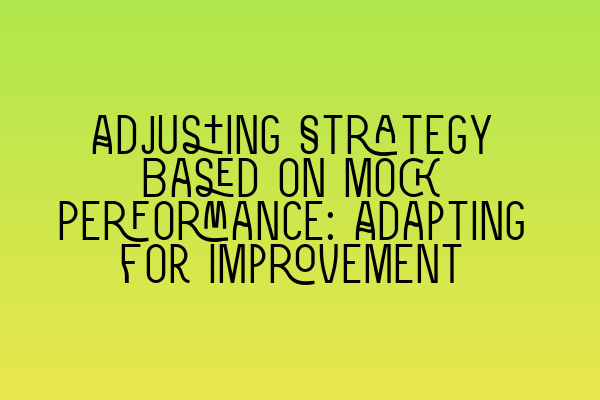Adjusting Strategy Based on Mock Performance: Adapting for Improvement
As aspiring solicitors, continuous improvement and adaptation are vital for success in the SQE exams. One powerful tool to help you prepare for the challenges ahead is the use of mock exams. Mock exams simulate the real exam experience, giving you an opportunity to assess your strengths and weaknesses, identify areas for improvement, and adjust your study strategy accordingly. In this blog post, we will explore the importance of adjusting your strategy based on mock performance and provide practical tips to help you adapt for improvement.
Why Mock Exams Matter
Mock exams replicate the conditions and format of the actual SQE exams, allowing you to practice under timed conditions and experience the pressures of the exam environment. They provide a realistic assessment of your knowledge, skills, and exam technique, enabling you to identify gaps in your understanding and areas where you require further study.
By taking mock exams, you can familiarize yourself with the types of questions you are likely to encounter, understand the levels of complexity, and become comfortable with the structure and format of the exam papers. This familiarity can significantly reduce anxiety on the actual exam day, increasing your chances of performing at your best.
Mock exams also provide an opportunity for self-assessment. By comparing your performance against model answers or grading criteria, you can gain valuable insights into your strengths and weaknesses. This reflection allows you to focus your efforts on areas that need improvement, ultimately maximizing your chances of success in the real exam.
Adapting Your Study Strategy
Once you have completed a mock exam and evaluated your performance, it’s time to adapt your study strategy based on the insights gained. Here are some effective strategies to help you improve:
1. Analyze Your Performance
Take the time to thoroughly analyze your mock exam performance. Identify the topics or question types where you struggled the most. This analysis will provide a clear picture of your weaker areas and guide your future study plans.
2. Seek Additional Resources
If you struggled with certain topics during the mock exam, seek out additional resources to deepen your understanding. There are various online platforms, textbooks, and reference materials available that can provide detailed explanations and practice questions related to specific areas of law. Utilize these resources to reinforce your knowledge and address any gaps in your understanding.
For example, if you require further understanding of joint ownership, you can explore this article on joint ownership legal considerations for co-owners of property to gain more insights and improve your understanding in this area.
3. Prioritize Weak Areas
When planning your study schedule, allocate more time and effort to the topics or question types where you struggled the most in the mock exams. By prioritizing your weak areas, you can ensure that you dedicate sufficient time to understanding the concepts, practicing related questions, and consolidating your knowledge.
For example, if commercial leases posed a challenge in your mock exams, you can refer to this article on essential insights for business premises to gain a better understanding of the legal considerations involved in commercial leases.
4. Practice, Practice, Practice
Mock exams are an excellent way to identify areas where you need more practice. By utilizing past papers, sample questions, and practice exams, you can develop your exam technique, improve your time management skills, and become familiar with the types of questions that may appear in the actual exams.
Mock exams provide a performance baseline and highlight areas for improvement. Regularly practicing questions and mock exams will help you build your confidence, strengthen your understanding, and enhance your ability to apply legal principles accurately and efficiently.
Additionally, if you are seeking to enhance your understanding of tenant rights, you can refer to this article on tenant rights in the UK, which offers valuable insights into the legal protections afforded to tenants.
5. Review Model Answers
Reviewing model answers and grading criteria for mock exams is crucial for self-assessment. Compare your answers to the model solutions, identify areas of improvement, and understand the reasoning behind the correct answers.
When reviewing model answers, pay attention to the structure, key points, and level of detail. This analysis will help you refine your answer approach and ensure that your responses align with the expectations of the examiners.
Conclusion
Mock exams serve as valuable tools to assess your progress, identify areas for improvement, and adapt your study strategy accordingly. By analyzing your performance, seeking additional resources, prioritizing weak areas, practicing regularly, and reviewing model answers, you can optimize your preparation and increase your chances of success in the SQE exams.
Property practice is a crucial area within the SQE exams, and understanding the intricacies of property transactions and land law is paramount. To expand your knowledge further, you can refer to this comprehensive guide on property transactions and the legal process, as well as this article examining the intricacies of land law in the UK.
Remember, the key is to adapt your study strategy based on mock performance and continuously strive for improvement. Good luck with your SQE preparations!

Leave a Reply